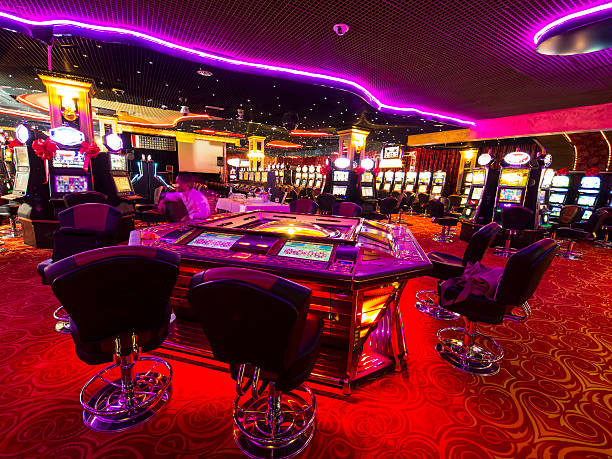The realm of casino gaming has experienced a significant transformation in past times, driven by technological advancements and changing consumer tastes. As an increasing number of players turn to online mediums for entertainment, traditional gambling activities are being increasingly adapted to satisfy the demands of a tech-savvy audience. This transition not only involves the transition from physical to virtual spaces but also covers the evolution of gaming mechanics and player engagement strategies.
In this emerging digital age, video game creators are harnessing cutting-edge techniques to develop engaging experiences that resonate with a varied spectrum of gamers. From web-based slot games with breathtaking visuals to interactive table activities that mimic the feel of a real-life gambling hall, the adaptation process is redefining how we perceive and enjoy casino activities. As we explore this fascinating process, it becomes evident that the future of gambling lies in the smooth integration of advanced tech with the everlasting allure of luck and strategy.
A Evolution of Casino Entertainment
Gambling entertainment have undergone significant transformations throughout the years, showing shifts in technology, culture, and player tastes. In ancient eras, basic games of chance were played using simple materials such as stones and bones. As civilizations evolved, so did the sophistication of these games. The introduction of card games in the Middle Ages marked a pivotal moment, leading to the creation of popular titles like Texas Hold’em and blackjack, which are continuously enjoyed in the present. Over the centuries, the physical layout of gambling establishments has also changed, shifting from small local locations to large, elaborate establishments.
The twentieth century ushered a change in the world of gambling games with the arrival of electronic gaming. Fruit machines appeared as a popular attraction, captivating players with their vibrant lights and audio effects. This era also saw the emergence of gambling hotels, which merged high-end accommodations with a wide variety of gaming options. The introduction of video gaming further broadened the landscape, allowing for more complex designs and gaming mechanics. These innovations not only attracted a wider audience but also changed the way gambling entertainment were played.
With the rise of the internet in the late 90s and early 2000, gambling entertainment moved into a new online phase. Virtual casinos emerged, providing players with the convenience of gaming from their homes. This shift required game developers to reinvent traditional mechanics and modify them for an interactive online experience. Today, advancements in tech, including mobile gaming and VR, continue to shape the evolution of gambling games, creating engaging experiences that captivate players like not before.
Primary Attributes of Virtual Casino Experiences
Digital casino games have transformed the way participants engage with casino gaming by offering immersive experiences that replicate the thrill of traditional casinos. depo288 One of the most notable features is the use of top-notch graphics and animations, resulting in a visually stunning appealing environment. Developers focus on providing lifelike themes and enthralling storylines that draw players into the game, improving their overall experience. The capability to offer 3D visuals and spectacular sound effects means that players can experience a vibrant atmosphere similar to what they would find on a casino floor.
Another important aspect of digital casino games is the accessibility they offer to users worldwide. Online platforms enable individuals to play their preferred games from the comfort of their own houses or on the go through smartphones and tablets. This flexibility is accompanied by a wide variety of game options, including slots, tabletop games, and live dealer experiences. Players no longer need to drive to a casino to enjoy their favorite betting experiences, allowing a larger audience to engage with gaming.
Lastly, virtual gaming experiences frequently include innovative features such as engaging gameplay and social elements. Many games now allow players to challenge one another against one another, participate in tournaments, or even post their accomplishments on social networking sites. This shift encourages a community spirit among players while fostering positive competition. Additionally, features like customizable avatars and in-game chat options boost social interaction, making the digital gaming experience even more engaging for all users.
The Outlook of Digital Gaming
When technology advances, the landscape of online gaming is set for significant change. Immersive and augmented reality are creating a buzz, offering players an engaging adventure that reflects the thrill of being in a real-life casino. These advancements create opportunities for developers to introduce innovative game formats and engagement tools, reshaping how players interact with their favorite casino games.
Furthermore, the integration of smart technology is improving user experiences and personalizing gameplay. AI can assess player behavior, offer tailored game options, and improve customer support through virtual agents. This customization not only retains players engaged but also assists build a committed community around specific casino platforms, setting them for success in a competitive market.
In conclusion, the rise of mobile gaming is another vital factor shaping the future of online gaming. With an constantly rising number of players enjoying casino games on their smartphones, creators are concentrating on optimizing their platforms for smartphone compatibility. This shift allows players to experience casino games anywhere, paving the way for a more versatile and approachable gaming environment that attracts a wider audience.

